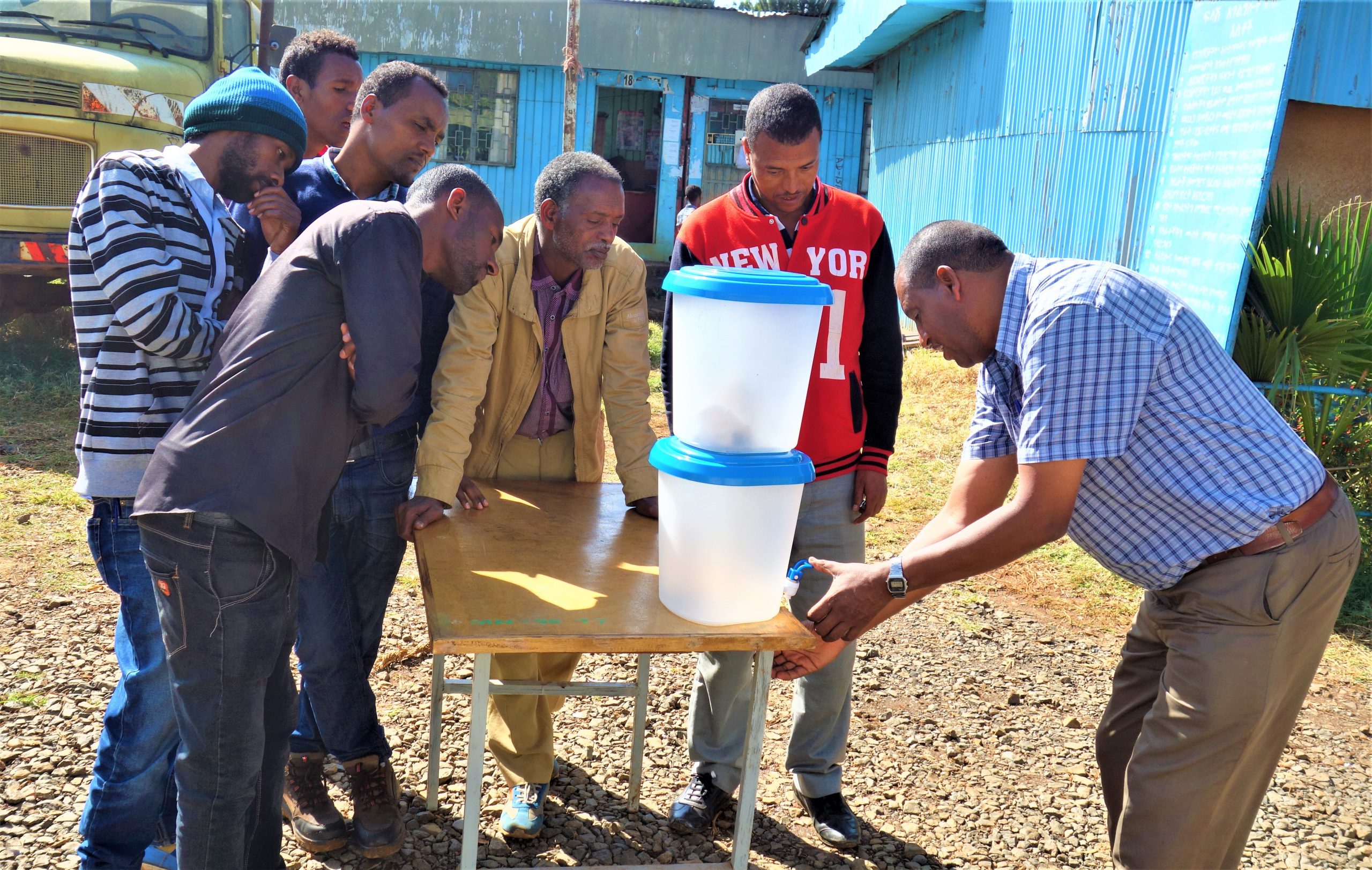In early March 2020, Gashaye Chekol Yihunie, Aqua for All’s Ethiopia country coordinator, opened the door of the new Aqua for All office in Addis Ababa. From there, Gashaye would continue working with the government of Ethiopia to embed Aqua for All’s water filters distribution programme in the yearly plans of several ministries. The COVID-19 outbreak changed these plans abruptly. Find below Gashaye’s story about the situation in his country.
What has been Aqua for All’s role in Ethiopia?
In Ethiopia, access to water and sanitation is among the lowest worldwide. Over 62 million people do not have access to safe water. In 2016, Aqua for All piloted a one-year programme to ensure safe water at point of use through water filters with zonal water utility Finote Selam, and the rural woredas (districts) in the Amhara Region. The Ministry of Water, Irrigation and Energy of Ethiopia supported the pilot. From 2017, the programme expanded to four zones supporting 82 water utilities. Working from our local office would accelerate scaling up the programme to all 200 water utilities in Amhara.
How did your ‘regular’ month look before the COVID-19 outbreak?
Before COVID-19, I spent at least one week per month in the field. Aqua for All was facilitating the distribution of over 45,000 water filters by the end of July 2020, using the kebele (smallest administrative unit) structure in the Amhara Region. The rest of the month, I worked with woreda water offices, zonal water utilities, health extension workers, agricultural development agents, and private promoters from the office.
Then the COVID-19 outbreak changed the plans…
COVID-19 measures limited travel within the country, and I have to work from home. Without being in Amhara, it is hard to keep track of the progress of 82 zonal and small utilities spread in West Gojjam, East Gojjam, Awi and South Gondar Zones.
The health sector stopped distributing water filters to focus on the COVID-19 response. Water supply became the priority. All budgets, including the revolving fund for water filters’ distribution, were used for repairs and serving more communities. This is very expensive, given the set-up of Ethiopian rural communities.
How did the COVID-19 crisis expose the service gap?
In some towns, like Debre Markos and Yetmen, access to water is limited. In rural communities, hand dug wells are over-used exceeding the water yield. Water consumption per capita increased due to frequent handwashing. For instance, almost every institution and household have handwashing facilities with soap outside the building or house.
Water utilities and woreda water offices manage urban and rural water supply, respectively. They have a significant budget shortage for operations, maintenance, expansion and construction of new schemes. Besides, the private sector’s engagement is weak due to insufficient financial capacity. It needs getting service contracts and accessing funds to survive.
What is the situation in health centres?
Health centres are at the forefront of COVID-19 response focusing on prevention, treatment, and information. A 2017 study on water, sanitation, and hygiene[1] showed that 62% of Ethiopian rural health care facilities had continuous 24-hour water supply, but disruptions were reported by 22% of them. Only 7% of rural health care facilities have combined access to improved water on premises, functional and improved sanitation, and continuous access to soap and water for handwashing. Water supply must be improved by building new water lines, repairing broken water systems, placing water filters in patient wards and quarantine facilities.
What challenges and opportunities do water providers face?
The short term looks challenging since water tariffs were reduced and utilities cannot collect water bills. In some towns, customers did not regularly pay their bills for more than two months. Currently, payment has partially resumed. This revenue shortfall affects operations, maintenance, salary payments, and expanding waterworks.
At the same time, the government is spending more on repairs, completion of projects and expanding water supply in rural and urban areas. This also creates opportunities for private enterprises. For example, 2,500 people in rural Dejen got access to water due to quick repairs. In Debre Markos, 3000 people got access to water after a new borehole became operational in record time – which normally requires two years to complete.
How can the financial gap be bridged?
Access to funds is critical. Water providers need provisions for emergency repairs and expansion. High interest rates and fixed terms prevent them from accessing funds from financial institutions. The Water Development Fund offers credit at a lower interest rate (4% per year), but private enterprises cannot access these funds because of government priorities and collateral gaps.
People want to avoid waterborne diseases and therefore minimise mortality risks from COVID-19. Therefore, the demand for household water filters has increased but water utilities cannot finance their distribution. In East Gojjam Zone alone, 10 out of the 24 utilities have exhausted their revolving fund in COVID-19 response. The government is looking for recapitalising the revolving fund for distributing water filters. It appreciates Aqua for All’s support allocating €30,000 to continue scaling up the water filters programme in East Gojjam and South Gondar Zones.
[1] Source: Water, Sanitation, and Hygiene in Rural Health-Care Facilities: A Cross-Sectional Study in Ethiopia, Kenya, Mozambique, Rwanda, Uganda, and Zambia (2017). http://www.ajtmh.org/content/journals/10.4269/ajtmh.17-0208#html_fulltext
